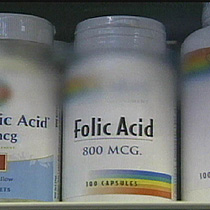-
(单词翻译:双击或拖选)
Washington, D.C.
07 June 2007
For years, doctors urged women to take folic acid if they planned to get pregnant. Then researchers discovered the nutrient1 helped reduce the risk of a heart attack. But now a new study shows folic acid may stimulate2 the growth of polyps in the colon3. And as VOA reports, polyps can lead to colon cancer.
 |
| Many companies produce folic acid supplements |
Gastroenterologists check a patient's colon during a procedure known as a colonoscopy. A new study published in the Journal of the American Medical Association shows that taking too much folic acid can cause polyps in the colon.
Doctor John Baron4 of Dartmouth University School of Medicine in the United States says the presence of polyps raises the risk of cancer. "Most colon polyps are benign5 and the reason to worry about them is simply that if you can remove them, you can prevent their developing into cancer," he says.
The American study of 1,000 people was equally divided between those who took one milligram of folic acid and those who took a placebo6 -- a 'sugar' pill or a pill with no medicine ingredient.
Researchers were trying to determine if folic acid prevented polyps. Dr. Baron says what researchers found surprised them. "We found that folic acid did not decrease the risk of colon polyps. In fact, in some analysis we saw suggestions that folic acid might increase risk of those polyps."
Not only did the vitamin stimulate their growth, they also increased the risk of something else affecting men in the group. "We also saw an increase in the risk of prostate cancer in the folate group,” Dr. Baron adds. “This is a surprising finding. It's far from definitive7, but it's something that should be looked into in the future."
Folic acid is a type of B vitamin. Combined with vitamins B-12 and C, it helps the body create and use protein. It also forms red blood cells and produces the genetic8 makeup9, called DNA10.
Folic acid is found in many of the foods we eat: for example, dark green leafy vegetables, wheat grains, beans and other legumes.
So with the exception of women who want to deliver a healthy baby, an extra supplement of folic acid may not be a good thing. At least until another study comes out.
 收听单词发音
收听单词发音
1
nutrient

|
|
| adj.营养的,滋养的;n.营养物,营养品 | |
参考例句: |
|
|
|
2
stimulate

|
|
| vt.刺激,使兴奋;激励,使…振奋 | |
参考例句: |
|
|
|
3
colon

|
|
| n.冒号,结肠,直肠 | |
参考例句: |
|
|
|
4
baron

|
|
| n.男爵;(商业界等)巨头,大王 | |
参考例句: |
|
|
|
5
benign

|
|
| adj.善良的,慈祥的;良性的,无危险的 | |
参考例句: |
|
|
|
6
placebo

|
|
| n.安慰剂;宽慰话 | |
参考例句: |
|
|
|
7
definitive

|
|
| adj.确切的,权威性的;最后的,决定性的 | |
参考例句: |
|
|
|
8
genetic

|
|
| adj.遗传的,遗传学的 | |
参考例句: |
|
|
|
9
makeup

|
|
| n.组织;性格;化装品 | |
参考例句: |
|
|
|
10
DNA

|
|
| (缩)deoxyribonucleic acid 脱氧核糖核酸 | |
参考例句: |
|
|
|















